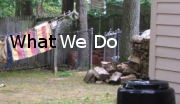Confluence:
1.
Derrick Jensen’s thought-provoking article in Orion Magazine, “Forget Short Showers” (July/August 2009):
The second problem [with wholly personal measures such as taking shorter showers, which Jensen finds “utterly insufficient”]—and this is another big one—is that it incorrectly assigns blame to the individual (and most especially to individuals who are particularly powerless) instead of to those who actually wield power in this system and to the system itself. Kirkpatrick Sale again: “The whole individualist what-you-can-do-to-save-the-earth guilt trip is a myth. We, as individuals, are not creating the crises, and we can’t solve them.â€
The third problem is that it accepts capitalism’s redefinition of us from citizens to consumers. By accepting this redefinition, we reduce our potential forms of resistance to consuming and not consuming. Citizens have a much wider range of available resistance tactics, including voting, not voting, running for office, pamphleting, boycotting, organizing, lobbying, protesting, and, when a government becomes destructive of life, liberty, and the pursuit of happiness, we have the right to alter or abolish it.
2.
This article in Scientific American (via the red mullet) about Phosphorous depletion:
Land ecosystems use and reuse phosphorus in local cycles an average of 46 times. The mineral then, through weathering and runoff, makes its way into the ocean, where marine organisms may recycle it some 800 times before it passes into sediments. Over tens of millions of years tectonic uplift may return it to dry land.
Harvesting breaks up the cycle because it removes phosphorus from the land. In prescientific agriculture, when human and animal waste served as fertilizers, nutrients went back into the soil at roughly the rate they had been withdrawn. But our modern society separates food production and consumption, which limits our ability to return nutrients to the land. Instead we use them once and then flush them away.
3. The poll I posted many months back: “Why do/ don’t you simplify/reduce/prepare for a Peak Oil/Global Warming future?” The results (voters could vote for more than one option):
62 votes for “I do”
a) 11 (18%): because I think if we all do this, we could turn this thing around
b) 6 (10%): I don’t know if we can save the day, but I simplify to prepare, in case it’s bad
c.) 12 (19%): It’s going to get bad, so I simplify to prepare (e.g. to get used to living with less)
d) 25 (40%): I simplify out of principle (e.g., take only what you need), regardless of the future
e) 7 (11%): I simplify because it saves me money
f) 1 (2%): Other
1 vote for “I don’t”
1 (100%): The problem is real, and the future bad, but my simplifying won’t change that
4.
Jay Griffiths’ great article in the same Orion Magazine, about the Transition Initiative.
A WHILE AGO, I heard an American scientist address an audience in Oxford, England, about his work on the climate crisis. He was precise, unemotional, rigorous, and impersonal: all strengths of a scientist.
The next day, talking informally to a small group, he pulled out of his wallet a much-loved photo of his thirteen-year-old son. He spoke as carefully as he had before, but this time his voice was sad, worried, and fatherly. His son, he said, had become so frightened about climate change that he was debilitated, depressed, and disturbed. Some might have suggested therapy, Prozac, or baseball for the child. But in this group one voice said gently, “What about the Transition Initiative?â€
[…] Many people feel that individual action on climate change is too trivial to be effective but that they are unable to influence anything at a national, governmental level. They find themselves paralyzed between the apparent futility of the small-scale and impotence in the large-scale. The Transition Initiative works right in the middle, at the scale of the community, where actions are significant, visible, and effective.
[…] Many people today experience a strange hollow in the psyche, a hole the size of a village.
5.
I recognize that child. When I was around the same age (12) I watched The Day After, a movie that will, unfortunately, haunt me forever (I wrote about it before). Oil (and phosphate and…) depletion, global warming, economic collapse, famine migrations: they are the new nuclear threat – worse, they are fact, not threat – on top of the old nuclear threat. The well-informed twelve-year-old and this particular 29-year-old fall into despair.
So why do I do what I do? Why do I grow my own vegetables, make compost, line-dry my laundry? Why do I take short showers, close waste and energy loops on my “homestead”? Why am I on the lookout for a wood stove, a solar battery charger, a high pressure canner? Why am I drawing up plans for a root cellar and a chicken coop, and skimming through catalogs for fruit trees and berry bushes? Why do I refuse to “go shopping”? And despairing of ever having those rain barrels installed?
Not because I think we (as in you and I, all of us individuals) can turn this thing around – I agree with Jensen on that. I do it out of principle – I am convinced that to take only what you need is good for the soul. And to prepare my family, my daughter especially. But that’s not enough. It will not be enough if it’s just me, and on the other hand I feel helpless on the national, even state level (the level where a million to millions of lives and lifestyles are at stake).
So there it is, for me too: the middle ground. Transition. I too have a hole in my heart, the size of a town. This town. Working on and living in a Transition Town is, I think, the only way for me to live somewhat peacefully with what is happening.

Leave a comment